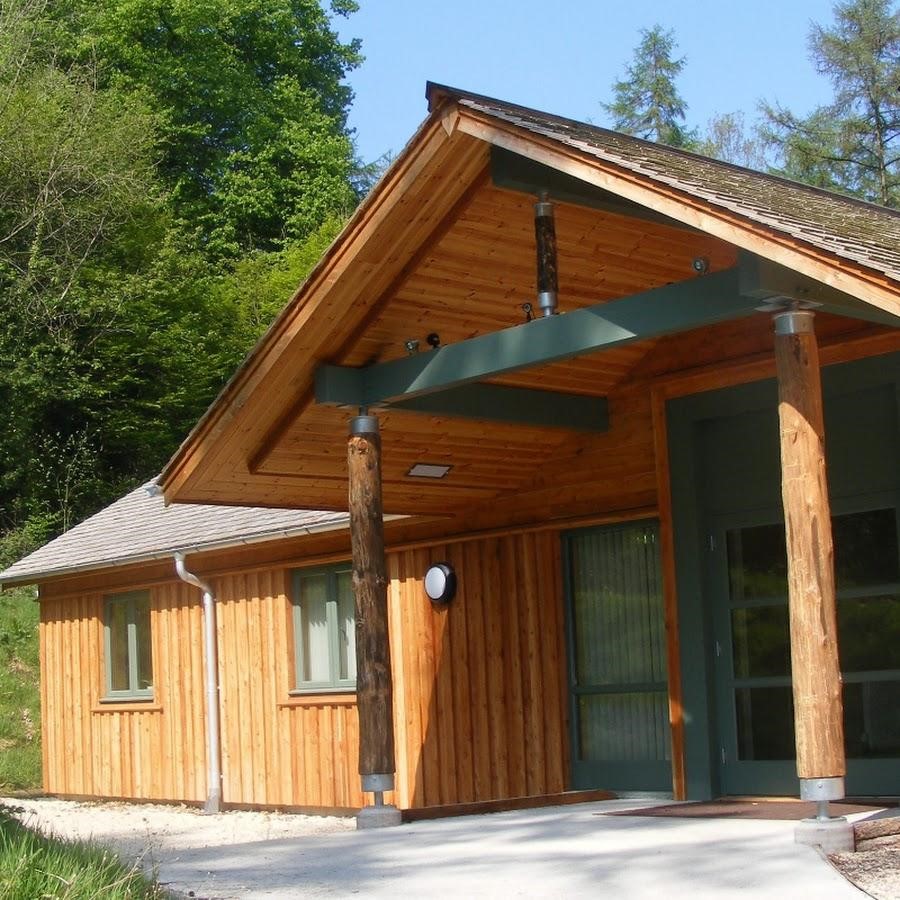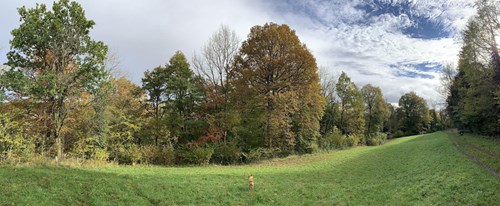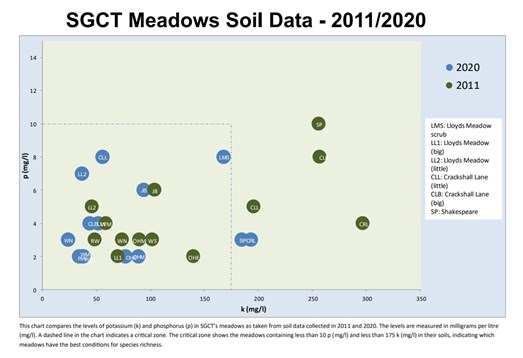Severn Gorge Countryside Trust - Steps to tackle Climate Change
Tuesday 19 January 2021
Severn Gorge Countryside Trust is an environmental conservation charity responsible for managing 270 ha of land in South Telford for the past 29 years.

Our aim is to ‘promote, protect and conserve the living landscape of the Ironbridge Gorge World Heritage Site’.
We look after beautiful woodlands and meadows, including three Sites of Special Scientific Interest (SSSI), as well as 60 historic structures. Allowing people to access our sites is important to us; we have installed more than 20 km of pathways and, unusually for the UK, our land remains open to the public 24/7.


The Ropewalk Meadow in autumn
Looking after outdoor spaces, we see how global warming is affecting the local landscape. While Ironbridge Gorge is no stranger to floods, their frequency and scale in recent years is troubling. Indeed, climate data indicates we must act now to avert climate catastrophe. This is why, like many other organisations, we declared a Climate Emergency together with our Trustees, and started planning how we will address climate change. We aligned our climate change ambitions with the UK government’s Green Future pledge, which includes reducing our emissions; maintaining good soil health, conserving natural capital, reducing flood risk, and providing opportunities to re-introduce native species.
In order to reduce our emissions, we first needed to understand our carbon baseline. To establish our baseline one of our Trustees; John Box created a Carbon Calculator using nationally recognised methods. Using this calculator we have begun measuring our carbon stock, our carbon sequestered, and carbon emitted. Our carbon stock is the carbon already present in our amenity grasslands, wildflower meadows, and woodlands, while carbon sequestered is the carbon we are capturing or drawing down each year in our grassland, meadows and woodlands. We are also measuring our carbon emitted, which includes our vehicle use and energy consumption.
By trying to understand our carbon footprint we have discovered that carbon is extremely complex. For example, we found that it isn’t as simple as just planting trees to sequester carbon. According to recent research, Continuous Cover Forestry (CCF) can increase carbon sequestration and therefore is an effective woodland management method to tackle climate change. CCF entails felling selected trees, thus allowing light to reach the woodland floor and permitting certain trees the space to grow. This approach creates robust and resilient woodlands with trees of different sizes. We have been practicing CCF for many years and were pleased to learn the important role CCF can play in addressing Climate Change.
To improve our carbon footprint, our aims include establishing a long term climate change monitoring project with Trustees, installing solar energy, using electric vehicles, and mob grazing our meadows. To monitor and measure carbon sequestration we hope to set-up long term sample plots within our CCF managed woodlands, which could also contribute to broader climate change research. And while our office is already built to Passivhaus standard as an energy efficient and award-winning eco build, we plan to install solar panels to further reduce our offices’ carbon footprint. Furthermore, we plan to transition from diesel to electric vehicles, and we have begun mob grazing by our Soay flock to lock carbon in the soil long-term, also improving soil health by increasing humus.
Looking after our soils is a vital aspect of our carbon pledge. Soil is created over thousands of years, thus presenting a finite resource and making it vital that we protect our soil’s health. Our grazing regime has gradually increased the biodiversity in our meadows, and to gain further understanding of our soils we have been measuring the potassium (k), phosphorus (p), soil organic matter, and soil organic carbon. We found that in all locations tested, the condition of the soils had improved and the soil organic matter and soil organic carbon was higher than the national average. The soil organic matter and soil organic carbon tests have been carried out in partnership with CREST University Centre Shrewsbury and Wolverhampton University. We are hoping to secure funding to continue and expand our soil tests throughout Telford in order to create recommendations for how to best manage the landscape for carbon capture and soil health.


As well as looking into soil health, we have been researching the feasibility of using soil moisture readings to help inform a flood alarm for Coalbrookdale residents. Climate change increases flood risk both locally and internationally, consequently requiring new flood mitigation approaches. Our research carried out in partnership with T&W Council and a range of other partners is part of a DEFRA/EA natural flood management research project. Part of this research has included looking into how hedges affect soil water infiltration, and installing and monitoring woody debris dams to understand their effectiveness in slowing water flow to alleviate flood-risk. We have applied for a grant to continue to monitor soil saturation and the wooden-debris dams in order to produce data that can help inform flood management approaches in the UK.
In addition to changing weather patterns, climate change impacts biodiversity. As woodland owners we take our role to protect and enhance biodiversity seriously, and therefore were thrilled to discover that one of our woodlands presents a good potential dormice habitat. Sadly dormice are in threat of extinction in the UK, and are already absent from 17 counties. Therefore, in partnership with the People’s Trust for Endangered Species, Shropshire Dormouse Group and Telford & Wrekin Council/APT Group, we are hoping to re-introduce dormice in 2022 as part of a long-term programme, giving the dormice every opportunity to thrive in their new environment.
Climate change affects us all, and we believe by working together with the local community, and local and national organisations, we can help bring positive change. If you would like to learn more about the work we do, or would like to come and volunteer with us, you can find more information on our website at www.severngorge.org.uk.